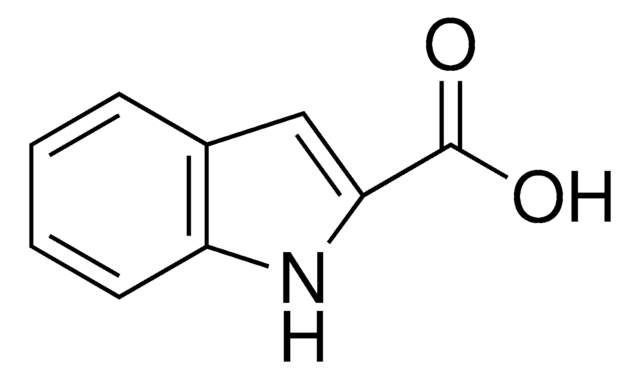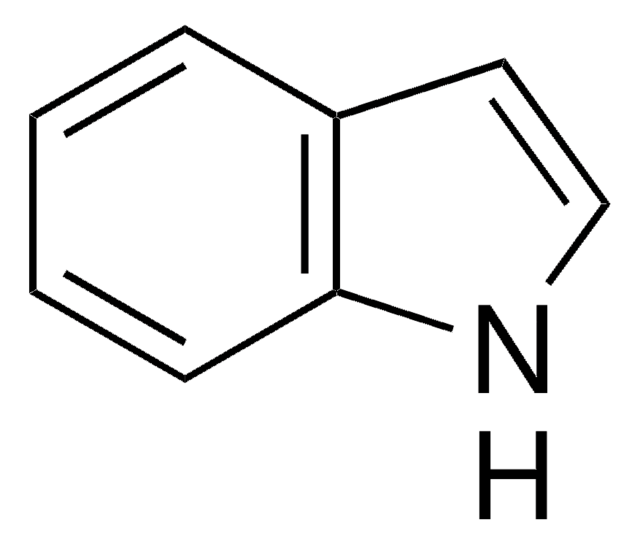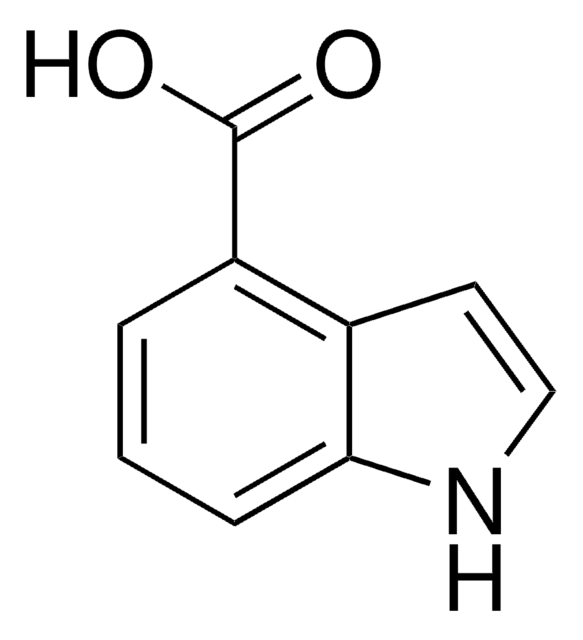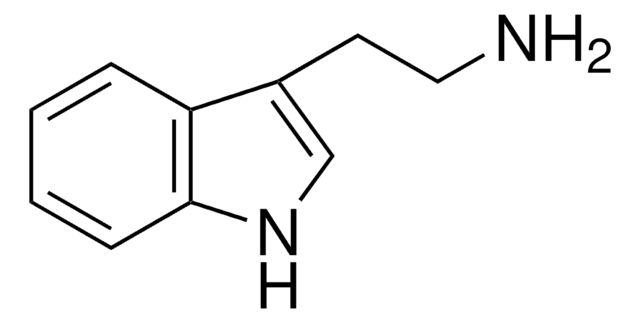All Photos(1)
About This Item
Empirical Formula (Hill Notation):
C10H9NO2
Molecular Weight:
175.18
MDL number:
UNSPSC Code:
12352106
PubChem Substance ID:
Recommended Products
description
AldrichCPR
form
solid
SMILES string
OC(CC1=CC(C=CC=C2)=C2N1)=O
InChI
1S/C10H9NO2/c12-10(13)6-8-5-7-3-1-2-4-9(7)11-8/h1-5,11H,6H2,(H,12,13)
InChI key
QOPBEBWGSGFROG-UHFFFAOYSA-N
Other Notes
Please note that Sigma-Aldrich provides this product to early discovery researchers as part of a collection of unique chemicals. Sigma-Aldrich does not collect analytical data for this product. Buyer assumes responsibility to confirm product identity and/or purity. All sales are final.
NOTWITHSTANDING ANY CONTRARY PROVISION CONTAINED IN SIGMA-ALDRICH′S STANDARD TERMS AND CONDITIONS OF SALE OR AN AGREEMENT BETWEEN SIGMA-ALDRICH AND BUYER, SIGMA-ALDRICH SELLS THIS PRODUCT "AS-IS" AND MAKES NO REPRESENTATION OR WARRANTY WHATSOEVER WITH RESPECT TO THIS PRODUCT, INCLUDING ANY (A) WARRANTY OF MERCHANTABILITY, (B) WARRANTY OF FITNESS FOR A PARTICULAR PURPOSE, OR (C) WARRANTY AGAINST INFRINGEMENT OF INTELLECTUAL PROPERTY RIGHTS OF A THIRD PARTY, WHETHER ARISING BY LAW, COURSE OF DEALING, COURSE OF PERFORMANCE, USAGE OF TRADE OR OTHERWISE.
NOTWITHSTANDING ANY CONTRARY PROVISION CONTAINED IN SIGMA-ALDRICH′S STANDARD TERMS AND CONDITIONS OF SALE OR AN AGREEMENT BETWEEN SIGMA-ALDRICH AND BUYER, SIGMA-ALDRICH SELLS THIS PRODUCT "AS-IS" AND MAKES NO REPRESENTATION OR WARRANTY WHATSOEVER WITH RESPECT TO THIS PRODUCT, INCLUDING ANY (A) WARRANTY OF MERCHANTABILITY, (B) WARRANTY OF FITNESS FOR A PARTICULAR PURPOSE, OR (C) WARRANTY AGAINST INFRINGEMENT OF INTELLECTUAL PROPERTY RIGHTS OF A THIRD PARTY, WHETHER ARISING BY LAW, COURSE OF DEALING, COURSE OF PERFORMANCE, USAGE OF TRADE OR OTHERWISE.
Signal Word
Warning
Hazard Statements
Precautionary Statements
Hazard Classifications
Eye Irrit. 2 - Skin Irrit. 2 - STOT SE 3
Target Organs
Respiratory system
Storage Class Code
11 - Combustible Solids
WGK
WGK 3
Flash Point(F)
Not applicable
Flash Point(C)
Not applicable
Choose from one of the most recent versions:
Certificates of Analysis (COA)
Lot/Batch Number
Sorry, we don't have COAs for this product available online at this time.
If you need assistance, please contact Customer Support.
Already Own This Product?
Find documentation for the products that you have recently purchased in the Document Library.
Customers Also Viewed
Timothy A Tomko et al.
ACS synthetic biology, 6(7), 1343-1350 (2017-03-21)
Microorganisms can produce hydrocarbons that can serve as replacements or additions to conventional liquid fuels for use in the transportation sector. However, a common problem in the microbial synthesis of biofuels is that these compounds often have toxic effects on
Cristian Dal Cortivo et al.
Frontiers in plant science, 8, 2072-2072 (2017-12-23)
Most crops are routinely protected against seed-born and soil-borne fungal pathogens through seed-applied fungicides. The recently released succinate dehydrogenase inhibitor (SDHI), sedaxane
Oriana Flores et al.
Frontiers in microbiology, 9, 1907-1907 (2018-09-07)
In recent years, Chilean kiwifruit production has been affected by the phytopathogen Pseudomonas syringae pv. actinidiae (Psa), which has caused losses to the industry. In this study, we report the genotypic and phenotypic characterization of 18 Psa isolates obtained from
Qiming Cheng et al.
BMC genomics, 19(1), 807-807 (2018-11-09)
Alfalfa (Medicago sativa) is a widely cultivated, essential commercial forage crop. The protein content in its leaves is the critical factor in determining the quality of alfalfa. Thus far, the understanding of the molecular mechanism of alfalfa defoliation traits remains
Adriano Stephan Nascente et al.
Environmental science and pollution research international, 24(32), 25233-25242 (2017-09-21)
Microorganisms can promote plant growth by increasing phytomass production, nutrient uptake, photosynthesis rates, and grain yield, which can result in higher profits for farmers. However, there is limited information available about the physiological characteristics of lowland rice after treatment with
Our team of scientists has experience in all areas of research including Life Science, Material Science, Chemical Synthesis, Chromatography, Analytical and many others.
Contact Technical Service








